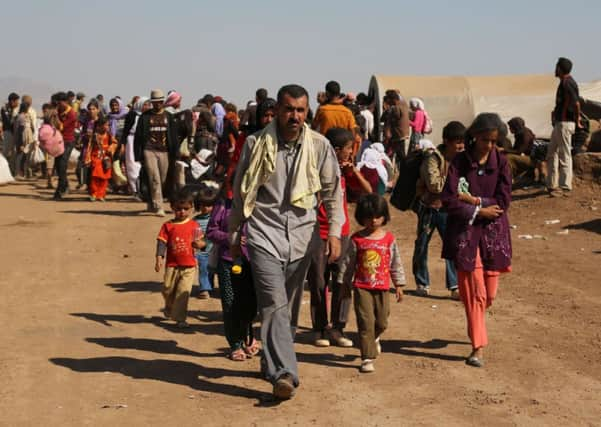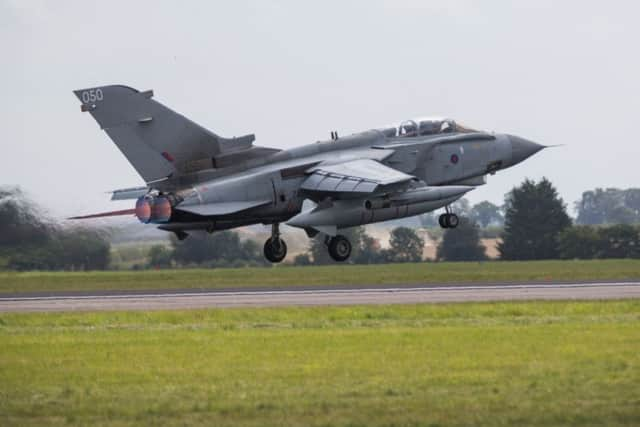UN chiefs warn of Iraq ‘genocide’ as UK sends jets


As many as 30,000 Yazidis remain trapped on a mountainside by extremist forces of Islamic State (IS), a situation that could lead to mass loss of life “within days or hours”, UN officials said.
With the UK also preparing to send Chinook transport helicopters to Iraq as it escalates its mission to drop vital aid supplies, there have been renewed calls for Britain to join the US in direct military strikes against IS insurgents.
Advertisement
Hide AdAdvertisement
Hide AdIt is understood that although the RAF Tornados have been deployed to assist Hercules cargo planes in identifying safe places to drop aid packages on Mount Sinjar, the aircraft are fully armed.


US intelligence reports suggest IS gained access to Stinger missiles after overrunning Iraqi army divisions in Mosul and Tikrit and there are fears the Tornados could be drawn into combat.
The development comes as a growing cross-party coalition of MPs, led by former foreign secretary Jack Straw and former armed forces minister Andrew Robathan, urged Britain to join in the US strikes against IS fighters.
Around a quarter of a million Iraqis from religious minorities have already fled their homes in the face of “convert or die” ultimatums from the advancing militants, with women executed or taken as slaves and teenagers sexually assaulted, a UN report concluded. A spokeswoman urged: “All possible measures must be taken urgently to avoid a mass atrocity and potential genocide within days or hours. Civilians need to be protected on the ground and escorted out of situations of extreme peril.”
Earlier, US Secretary of State John Kerry urged Iraqi prime minister-designate Haidar al-Abadi to form an inclusive government, while ruling out sending US combat troops to the country. He said: “There will be no reintroduction of American combat forces into Iraq. This is a fight that Iraqis need to join on behalf of Iraq.”
Foreign Secretary Philip Hammond chaired another meeting of the government’s emergency committee Cobra on the next stage of Britain’s response to the crisis and also discussed the situation during talks with Australian prime minister Tony Abbott.
Mr Hammond rejected demands for the recall of parliament to discuss the crisis, saying “not at the moment, no”, when asked if MPs should be brought back to Westminster.
Three Tornado jets left RAF Marham in Norfolk yesterday afternoon to travel to a “pre-position” in Cyprus from where they will fly to northern Iraq to provide improved surveillance of the situation on the ground. The jets, fitted with Litening III targeting and surveillance pods, will be able to fly over the crisis area to provide intelligence and help with the delivery of humanitarian aid.
Advertisement
Hide AdAdvertisement
Hide AdA total of three air drops have been carried out – one on Saturday and two last night.
The Department for International Development (DfID) said latest drops included 3,180 reusable water purification containers filled with 15,900 litres of clean water and 816 solar lamps that can also be used to charge mobile phones.
The UN said that as many as 35,000 people had managed to reach Iraqi Kurdistan’s Dohuk governorate after escaping from Mount Sinjar.
“The new arrivals are exhausted, dehydrated and many have suffered sun or heat stroke, with the daily temperatures reaching 40 to 45 degrees,” said UN High Commissioner for Refugees spokesman Adrian Edwards.
A further 10,000 to 15,000 had arrived in Syria, but as many as 30,000 remained on the mountain.
Downing Street has indicated that the government is also looking at how it can play a role in getting equipment to Kurdish forces so they are better able to counter IS, formerly known as the Islamic State of Iraq and the Levant (Isis).
International development secretary Justine Greening said: “UK aid is reaching the people who desperately need it in northern Iraq.”
But voices continued to be raised in favour of a more direct military intervention – and for MPs to be recalled from their summer break to debate and vote on it.
Advertisement
Hide AdAdvertisement
Hide AdTory MP Mark Pritchard became the latest to join politicians and former military chiefs in urging a stronger response, including targeted air strikes and drone attacks – but falling short of sending ground forces back to the country.
He predicted a recalled Commons would vote in favour of the escalation.
“The international community can pour as much aid into the region as its likes,” he said.
“But unless Islamic State fighters are killed and removed from the battlefield, they will go on killing and committing further atrocities.
“This intervention needs to be in an unequivocal combat role, not just in an intelligence, surveillance and targeting role.”
US air strikes on insurgent positions over recent days have helped Kurdish peshmerga fighters defending Irbil – the capital of the autonomous northern region – to regain some territory from the IS forces, including two towns.
Labour MP Gisela Stuart, a member of the Commons defence select committee, wrote to Speaker John Bercow calling for the Commons to be recalled for an emergency debate on the situation.
She said: “Clearly the government is taking some decisions on Iraq and I think they have to explain what their plan is.”
Advertisement
Hide AdAdvertisement
Hide AdOne of Britain’s most senior generals accused the “commitment-phobic” government of being “terrified” of intervening in the Iraq crisis before next year’s general election.
General Sir Richard Shirreff said: “The longer we sit on our hands and prevaricate, the more dangerous the situation is going to become.”
Prime Minister David Cameron is on a family holiday in Portugal but due back in No 10 later this week.
l Some 45 per cent of Britons would back air strikes in Iraq by RAF jets, with 37 per cent opposed to the UK joining the US in launching attacks against IS militants, an opinion poll has suggested.
But the ComRes survey for ITV News found there was resistance to sending British troops back to Iraq, with 63 per cent of those surveyed opposed to any deployment of ground forces and just 17 per cent in favour.
SEE ALSO